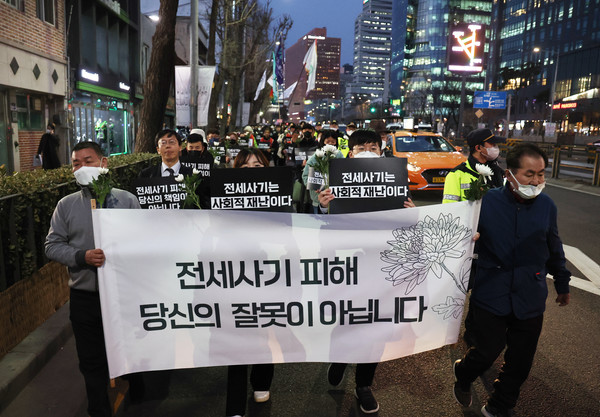 |
Even if I can't get my own house right now. I thought I could rent a house near my workplace for a certain period of time and work hard to get my own house. The rented house was suddenly auctioned off? I can't even get a deposit from the owner?
Can you believe a situation where you have to leave the house you used to live on a lease and you don't get a deposit on a lease, which is a "bolt from the blue" situation? But this is really happening. The "fraud by leasing" incident, which began to be exposed to the media in 2022, is occurring nationwide and the damage is significant. Victims have complained of extreme stress because they thought they couldn't get back the deposit they had collected, and some of them killed themselves
In this issue, let's learn about the current status, causes, and countermeasures of real estate crimes, ‘lease fraud’ that are bothering the people of Korea.
The Lease Fraud.
It is necessary to briefly organize related terms before learning about the method and type of lease fraud. The lessor, landowner, refers to a person who owns a house and lends the house with a lease deposit. The lessee, that is a tenant, refers to a person who enters the landlord's house through a lease contract. A lease contract means a contract concluded between lessor and tenant by the tenant paying the deposit. Through a lease contract, the lessor lends the house to the tenant, and the tenant entrusts the lease deposit to the lessor. A licensed real estate agent is a person who helps with the lease process.
The lease fraud method can be classified into three types: before preparing a contract, while preparing contract, and after signing a contract. Before writing a contract, the typical method of lease fraud that occurs when selecting a house is ‘can’ lease fraud. A ‘can lease fraud’ refers to a type of fraud in which a lessor signs a lease contract with a “can house” prepared by gap speculation and does not return a deposit to the tenant in the future. Gap speculation is a speculation method in which a lessor selects a house with a small difference (gap) between the sale price and the lease deposit and pays sale price of house by the lease deposit of the tenant and loan or their own capital. Usually, a lessor who has made gap speculation prepares even a small difference (gap) through loans. In summary, there is little share of the lessor because the housing sale price is prepared by the tenant's lease deposit and bank loan. A house traded in this form is called a "can house" in the sense that the shell exists by the inside is empty.
The problem with a “can house” is that the lessors’ capital is low or doesn’t exist in the housing sale price, so the lessor can avoid repaying the debt, that is tenant’s deposit, in the event of an incident. If a “can house” is auctioned off, if the house price falls and the tenant wants to move, and if the lessor’s economic situation is difficult, the lessor may not be able to return the deposit to the tenant. A “can house” with little share of the lessor is like a time bomb, so there is a high possibility that the deposit will not be returned from the moment the lease is signed.
 |
The typical lease fraud method that occurs when writing a contract is the type of turning a monthly rental house into a lease house. A normal licensed real estate agent has a company registered in the national spatial information portal and holds a certified license. This fraud method is begun with the establishment of a brokerage office by a fake licensed real estate agent who borrowed a certificate or a licensed real estate agent registration certificate. The fake licensed real estate receives a request for a monthly rent contract from the lessor and meets the lessee who wants to conclude lease contract. At this time, a fake licensed receives a lease deposit higher than the monthly rent deposit after signing a lease contract with the tenant, not the monthly rent what the lessor wants to conclude. It is a fraud method that damages both the lessor and the lessee by delivering a small amount of the deposit as much as the monthly rent deposit to the lessor and then stealing the remaining amount.
The typical lease fraud method that occurs while contracting is the type of double contract. This is a method in which the lessor does not return a lease deposit to two tenants for one house. In this case, the purpose of the lessor is to receive a large deposit twice or three times. Double contract fraud is related to ““can house”” fraud. It is difficult for the lessor to return the deposit if the existing tenant wants to move because the lessor’s capital does not exist in the housing sale price. Therefore, the lessor receives a deposit after finding a new tenant and covers the deposit of the existing tenant with it. In this case, it is a problem because a lessor who is unable to return the deposit may continue to conclude a contract with a new tenant and disappear without returning the deposit to the existing tenant if the contract is not completed.
The Korea Housing and Urban Guarantee Corporation (hereinafter referred to as HUG) is investigating the number of lease frauds and the amount of damage every month. According to a survey by HUG in 2022, the number of frauds related with deposits not returned to tenants in August was 511 and the damage amounted to 108.9 billion won. Based on a survey conducted in March 2023, there were 1,385 incidents in which tenants did not receive their lease deposits back, the highest ever. As of the March survey, 1,290 lease deposit incidents occurred in the metropolitan area and 95 in the non-metropolitan area, indicating that they are occurring mainly in the metropolitan area. As of March, there were 363 lease deposit incidents in Seoul and 458 incidents in Incheon. The number of incidents occurring in the provinces is only small at that time. The lease fraud, especially the fraud using “can house” can occur at any time, so it is like a time bomb. According to a survey by the Justice Party’s Sim Sang Jung office in 2023, 121,553 cases can be classified as high-risk groups for “can houses.” Subsequently, there are 111,481 potential “can housing” risk groups that will occur if housing prices fall in the future. Currently, about 230,000 households are exposed to the lease deposit fraud.
 |
It was the “King of Villa” incident in the Seoul metropolitan area that caused Korean society to become interested in lease fraud. Kim, called ‘the Villa King’ in the media, started the gap speculation for home rentals in 2020. As mentioned earlier, gap speculation is a method of renting house with a lease deposit received from a tenant and a bank loan. Kim signed lease contracts with a number of people with “can houses” he rented. Tenants asked him to return the deposit due to the expiration of the lease contract, but he refused to return the deposit because he had no capital. In October 2022, Kim died suddenly and the damage to tenants who did not receive the deposit was found to be about 17 billion won.
Some victims subscribed to guarantee insurance for returning lease deposit to avoid being involved in lease fraud before concluding contract. If a tenant subscribes to that guarantee insurance, the HUG guarantees the return of the lease through subrogation repayment. The HUG’s subrogation reimbursement is a system implemented when the lessor fails to return the lease deposit to the lessee after the contract period expires. When the tenant notifies the lessor of the termination of the lease, HUG pays the deposit first and later claims the right to indemnify the lessor to receive the debt as much as the deposit. However, in this case, subrogation reimbursement cannot be implemented at HUG because the tenant cannot notify the termination of the lease due to the death of the lessor, Kim. Accordingly, in December 2022, the Ministry of Land, Infrastructure and Transport of the Government announced that it would implement a relief project for victims. Although the requirements for termination of the lease contract have not been met, the subrogation reimbursement review is conducted first to advance the deposit return period. In addition, the Ministry of Land, Infrastructure and Transport announced that it would also carry out a project to support low-interest loans to tenants who failed to subscribe to guarantee insurance to return lease deposit.
Currently, the most controversial incident of lease fraud in Korea is “Architecture King” case in the Incheon City, and the damage is estimated to be about 12.5 billion won. The A, called the Architecture King borrowed the name of another person, such as a licensed real estate agent, to purchase land, and built villas or small apartments through a construction company he has operated. - He owned more than 2,700 households in Michuhol-gu Incheon, repeating the process of land purchase - new housing - raising funds with loans and lease deposits - purchasing land again. It is also a problem to prepare “can houses”without his own capitals, but the process of signing a lease contract is also a problem. Mr. A hired licensed real estate agents, and they signed a contract with the tenant, saying that there was no problem with the return of the lease deposit while hiding the fact that the real owner of the house was Mr. A. Mr. A could not afford the increasing interest due to the "can houses", and a number of houses began to be auctioned in January 2022. Even though licensed real estate agents were aware of the housing auction situation, they did not inform the victims of it and defrauded the deposit. The prosecution arrested A and five related figures on charges of fraud, but three tenants who were damaged by not receiving the deposit were killed themselves.
The caution of the Lease Fraud.
As the lease frauds have continued to occur, politicians began to focus on the cause this situation. At a meeting of victims of lease frauds on December 22, 2022, Land, Infrastructure and Transport Minister Won Hee-ryong mentioned institutional loopholes related to lease fraud. As an institutional loophole, he pointed out the situation in which tenants are damaged by debts caused by non-payment of taxes by lessors. The Korea Asset Management Corporation collects the amount of arrears by short-selling of the property owned by the lessor when lessor fails to pay the tax. In addition, it is highly likely that the tenant will be at risk of lease fraud due to an imbalance in information that the lessor’s arrears are not known at the time of lease contract. In order to solve these loopholes, the ‘Amendment to the Framework Act on National Taxes and the National Tax collection Act” was passed at the plenary session of the National Assembly on December 23, 2022. This is a bill that allows tenants to check whether lessors are in arrears with taxes without the consent of the lessor. Based on this bill, the lessee can check whether the lessor has paid the deposit tax until balance is paid after signing the lease contract.
In Korean politics, there is a heated debate over the claim that the fundamental cause of the lease fraud was the enforcement of the “Three Leases Act”. The "Amendment to the Housing Lease Protection Act," called the Three Leases Act, has been taken effect in July 2020. This is implemented for the purpose of protecting tenants by stipulating the monthly rent reporting system, the monthly rent ceiling system, and the right to request contract renewal. At the 4th Real Estate Ministers' Meeting in February 2023, Land, Infrastructure and Transport Minister Won Hee-ryong pointed out the 3rd Lease Act, saying, "The Three Leases Act and soaring housing prices have caused a lease crisis.” In addition, in April 2023, Minister Won Hee-ryong once again argued that "the implementation of the Three Leases Act when housing sales prices soared served as an opportunity to surge in the lease prices.” Representative Eom Tae-young of People Power Party, who attended the workshop, said, "Some experts analyzed that the three leases Act affected the occurrence of lease fraud," adding, "Even if the analysis is not perfect, it is necessary to take some responsibility.”
Solutions of the Lease Fraud.
On April 27, 2023, a “revised bill” of the Framework Act on Local Taxes, called the Act on the Handling of Lease Fraud, was passed at the plenary session of the National Assembly. Under the current Framework Act on Local Taxes, tenants receive lease deposit with the remaining money, excluding local taxes, because local taxes are collected before bonds such as lease deposits. According to the current laws, there is a problem that the tenant cannot fully receive the lease deposit back in the event of tax arrears by the lessor. In order to solve the legal limitations related to lease fraud, the National Assembly revised to reimburse the tenant’s deposit before local taxes when the house where the tenant resides is sold. However, in order to fully receive the lease deposit according to the amendment, the requirement of the existence of a ‘fixed date’ is required. The fixed date is the process of checking the date of the real estate contract. This is a concept similar to a transfer report, and a transfer report is a process of confirming the date by reporting that the move has been completed to a house with a real estate contract. Currently, as the damage of lease fraud increases, many people are receiving a fixed date when signing a real estate contract. Through the amendment, victims can receive a full lease deposit, but this is limited to the ability to pay the deposit to the lessor.
The Korean government has decided to implement the Special Support Act for Victims of the lease fraud, also known as the Special Act on lease Fraud, and apply it to victims for two years. The key to the Special Act on Lease Fraud is to help stabilize the housing of victims who have lost their place of residence immediately without receiving a deposit back due to Fraud. The first remedy in the Special Act on Lease Fraud is the right to purchase. First of all, the right to purchase is the right for the tenant to purchase this house first if the lease house is transferred to an auction or public sale due to the lessor’s tax arrears. If a tenant purchases a house through a preferential purchase right, the cost must be prepared by the tenant. Since most victims cannot receive a deposit back, the government will also provide long-term low-interest loans in consideration of this.
The second remedy is for the victim to transfer the "priority purchase right" to the Korea Land and Housing Corporation (hereinafter referred to as LH). This is a method that can be selected when the victim does not want to use the preferential purchase right. This is a method in which LH first receives the purchase right from the victim, purchases a lease house that has been transferred to an auction or public sale, and rents it to the victim. Victims can live in public rental houses for up to 20 years, and the rent is similar to existing public rental houses. The opposition party is insisting on the need for a "pre-support post-plan" that the deposit should be provided first for victims who have not received any deposit from the lessor. After pre-support, the idea is a method in which the bond purchase agency purchases the deposit return bond to support the victim and exercises the right to indemnify and collects the cost to the lessor. Accordingly, the government and the ruling party say that the plan is similar to the way in which the government pays the deposit with government taxes. They also pointed out that implementing the initiative after pre-support is not in line with other fraudulent support measures such as voice phishing or stock price manipulation. Representative Sim Sang Jung of the Justice Party to the opposition party said, "Frauds such as voice phishing were not caused by government policy failures.” She then argued that a special law is needed because the lease fraud case is a social disaster based on the government's policy failure.
 |
The reason why the Special Act on Lease Fraud has not been implemented immediately and is continuously being discussed in the National Assembly is because of the conditions for support. Existing application criteria are as follows: If a fixed date is received with opposing power, if an auction or public sale of a rental house is implemented, if house related with the lease fraud is a rental house considering area and deposit, if an intention for lessor to do fraud is checked through beginning of investigation, and if there are possibility to occur a large number of victims and that deposit cannot be returned to tenants. There were many opinions that the scope of the existing application criteria was narrow, and on May 3, 2023, a review was conducted to expand the scope of support. As of May 3, 2023, the amendment criteria to the application standard of the Special Act are as follows: If registration of the right of lease is completed even without opposing power or fixed date, if lessor begins bankruptcy and rehabilitation procedures or auction and public sale of a rental house, if a deposit is under 300 million won, possible to be max 450 million won, and if the lessor transfers the lease home ownership to a person who is unable to return the deposit.
The Opposition argued that the amendment is still narrow and insufficient. According to an interview with KBS News on May 3, 2023, the Democratic Party of Korea's subcommittee said that it is clear that the Special Act is progressed to revise the standard from "when a lease fraud investigation is initiated" to "when a landlord files for bankruptcy or initiates an auction process.” He then pointed out that it seems very uncertain to what extent the current amendment can cover victims of the lease fraud. The National Assembly of the Republic of Korea held a subcommittee meeting on May 1 and 3, 2023, to discuss the criteria for applying the special law and remedies, but the agreement between the ruling and opposition parties failed. After the subcommittee discussion, the plenary session, the judiciary committee, and the plenary session remain, but it is necessary to propose a special law as soon as possible for victims of the lease fraud that may still occur.
In April 2023, Inha University's student council invited Minister of Land, Infrastructure and Transport Won Hee-ryong to give a special lecture on youth housing policy. The special lecture is designed to explain complex housing policies related to the prevention of lease fraud to students. The special lecture deals with how to prevent lease fraud using smartphone applications, how to report transfer and report lease contracts, and the need to subscribe to guarantee insurance for returning lease deposit. Since then, the student council has announced that it will conduct a full investigation related to lease fraud with the school headquarters to protect students who are new to society from fraud. In addition, the student council requested the Ministry of Land, Infrastructure and Transport to open a professional counseling center on campus that students affected by lease fraud can visit. Jeon Soo-hyun, president of the student council, promised to try to protect students from lease fraud, saying, "The budget and authority of the student council are insufficient compared to the government, but the responsibility for students should be stronger than anyone else.”
 |
Through this issue, we could find out that the lease fraud was a very bad crime that sickened people’s bodies and minds. I’m afraid that the house to live in right now and the money I’ve saved have disappeared, but I dare think that the victims will suffer just by the fact that they were swindled.
Currently, Korea is taking various measures to solve the lease fraud. Since fraud took place across the country, the damage is large, and careful choices are needed, so the pace of legislation of the solution is slow. As of the first week of May 2023, a solution to the lease fraud is still under agreement between the ruling and opposition parties. I'm very curious about what solutions will be drawn in the future and I hope it can save as many victims as possible.
Do you consider lease fraud to be a social disaster or a personal dimension? In May 2023, the ruling and opposition parties are at odds over this in deciding on a solution. Social disaster and a personal dimension. It is a very important issue because the direction of the policy can vary depending on which one society chooses. I think we should consider what will lead Korean society in the right direction, although there is nothing wrong with the two.
이연수 lys0716@inha.edu
<저작권자 © 인하프레스, 무단 전재 및 재배포 금지>

![[보도] 제43대 총학생회 후보자 공청회 개최돼](/news/photo/202404/11686_5015_2626.png) [보도] 제43대 총학생회 후보자 공청회 개최돼
[보도] 제43대 총학생회 후보자 공청회 개최돼
![[보도] 제43대 총학생회 후보자 공청회 개최돼](/news/thumbnail/202404/11686_5015_2626_v150.jpg)
![[보도] 총학생회장 선거 열려···학생사회 대표자는?](/news/thumbnail/202403/11668_5014_266_v150.jpg)
![[보도] 무전공·계열제 논의···학생은 어디에?](/news/thumbnail/202403/11666_5011_2238_v150.jpg)
![[보도] 인하 70돌, 다양한 행사 이어져](/news/thumbnail/202403/11663_5009_165_v150.jpg)
